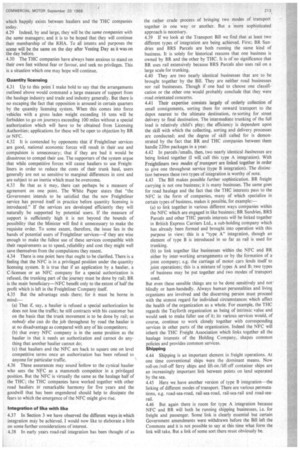Quantity licensing 4.31 Up to this point I make bold
Page 217

If you've noticed an error in this article please click here to report it so we can fix it.
to say that the arrangements outlined above would command a large measure of support from the haulage industry and trade and industry generally. But there is no escaping the fact that opposition is aroused in certain quarters by the quantity licensing system. When this comes into force vehicles with a gross laden weight exceeding 16 tons will be forbidden to go on journeys exceeding 100 miles without a special authorization which will have to be obtained from Licensing Authorities; applications, for these will be open to objection by BR or NFC.
4.32 It is contended by opponents that if Freightliner services are good, national economic forces will result in their use and compulsion is unnecessary; that if they are bad it would be disastrous to compel their use. The supporters of the system argue that w.hile competitive forces will cause hauliers to use Freightliners in order to reduce the costs of their trunk haul, users generally are not so sensitive to marginal differences in cost and are subject to an inertia which must be overcome.
433 Be that as it may, there can perhaps be a measure of agreement on one point. The White Paper states that "the Government intends to be satisfied that the new Freightliner service has proved itself in practice before quantity licensing is introduced." If the services are developed efficiently they will naturally be supported by potential users. If the measure of support is sufficiently high it is not beyond the bounds of possibility that the Minister will find it unnecessary to make the requisite order. To some extent, therefore, the issue lies in the hands of potential users of Freightliner services—if they are wise enough to make the fullest use of these services compatible with their requirements as to speed, reliability and cost they might well save themselves from the compulsions they resent.
4.34 There is one point here that ought to be clarified. There is a feeling that the NFC is in a privileged position under the quantity licensing system. It is true that if an application by a haulier, a C-licensee or an NFC company for a special authorization is refused, the trunking part of the journey must be done by rail; BR is the main beneficiary—NFC benefit only to the extent of half the profit which is left in the Freightliner Company itself.
4.35 But the advantage ends there; for it must be borne in mind:— (a) That if, say, a haulier is refused a special authorization he does not lose the traffic; he still contracts with his customer but on the basis that the trunk movement is to be done by rail; as nobody else can do the job throughout by road the haulier is at no disadvantage as compared with any of his competitors;
(b) that every NFC company is in the same position as the haulier in that it needs an authorization and cannot do anything that another haulier cannot do; (c) that hauliers and the NFC are back to square one on level competitive terms once an authorization has been refused to anyone for particular traffic.
4.36 These assurances may sound hollow to the cynical haulier who sees the NFC as a mammoth competitor in a privileged position. But the 'NFC is virtually the same as the haulage half of the THC; the THC companies have worked together with other road hauliers in remarkable harmony for five years and the goodwill that has been engendered should help to dissipate the fears to which the emergence of the NFC might give rise.


















































































































































































































































































































































































